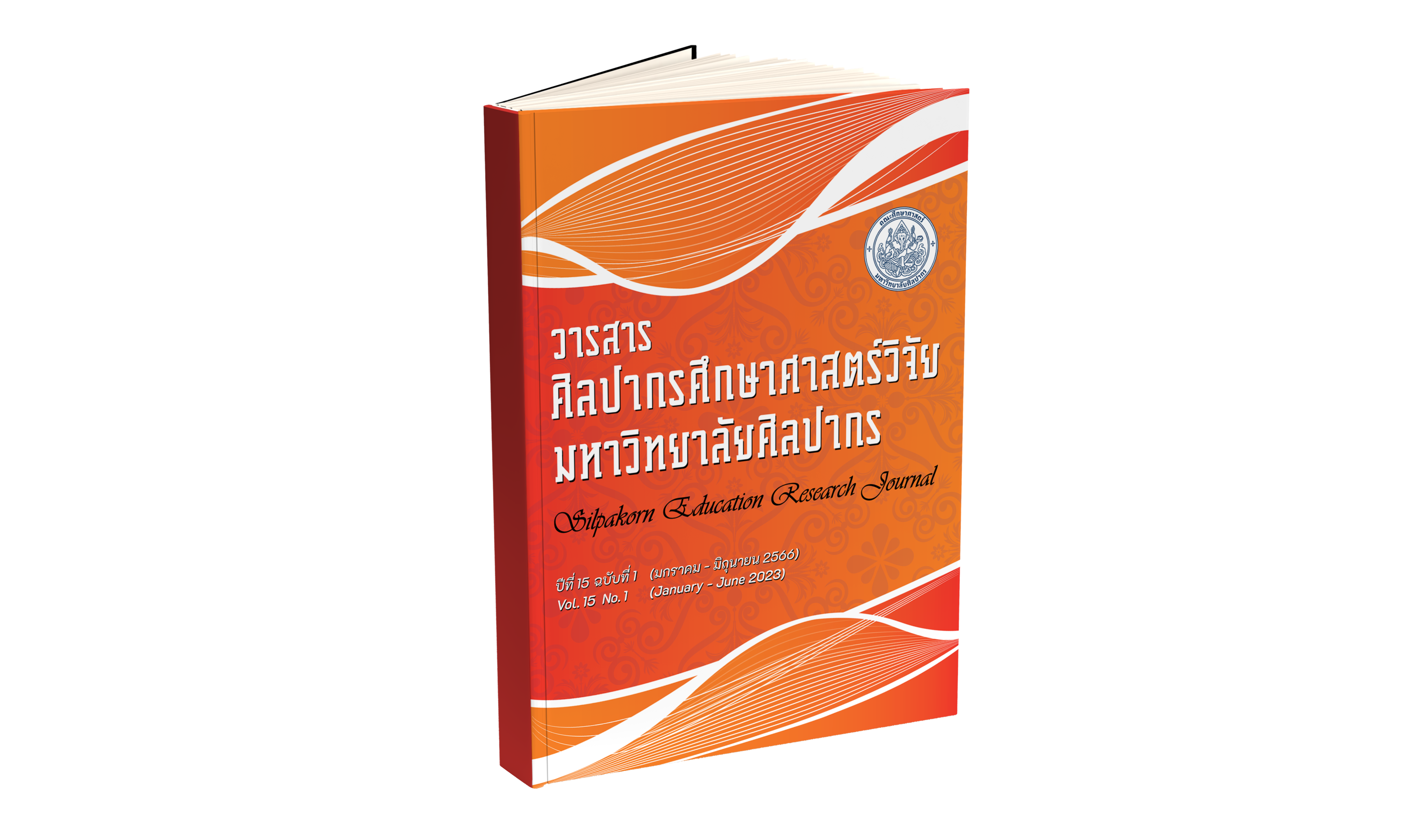การพัฒนาทักษะการโต้แย้งทางวิทยาศาสตร์ของนักเรียนชั้นมัธยมศึกษาปีที่ 2 ด้วยการจัดการเรียนรู้แบบสืบเสาะที่ขับเคลื่อนด้วยกลวิธีการโต้แย้ง ร่วมกับการใช้คำถามระดับสูง เรื่อง ทรัพยากรพลังงาน
คำสำคัญ:
ทักษะการโต้แย้งทางวิทยาศาสตร์, การจัดการเรียนรู้แบบสืบเสาะที่ขับเคลื่อนด้วยกลวิธีการโต้แย้ง, การใช้คำถามระดับสูงบทคัดย่อ
การวิจัยครั้งนี้มีวัตถุประสงค์เพื่อศึกษาทักษะการโต้แย้งทางวิทยาศาสตร์ของนักเรียนชั้นมัธยมศึกษาปีที่ 2 ที่เรียนรู้ด้วยการจัดการเรียนรู้แบบสืบเสาะที่ขับเคลื่อนด้วยกลวิธีการโต้แย้งร่วมกับการใช้คำถามระดับสูง เรื่องทรัพยากรพลังงาน กลุ่มตัวอย่างเป็นนักเรียนระดับชั้นมัธยมศึกษาปีที่ 2 ในภาคเรียนที่ 2 ปีการศึกษา 2565 จำนวน 40 คน โรงเรียนแห่งหนึ่งในจังหวัดสมุทปราการ ซึ่งได้มาจากการเลือกแบบตามความสะดวก เครื่องมือที่ใช้ในงานวิจัยประกอบด้วย แผนการจัดการเรียนรู้ แบบวัดทักษะการโต้แย้งทางวิทยาศาสตร์ และแบบสังเกตพฤติกรรมการโต้แย้งทางวิทยาศาสตร์ ทำการวิเคราะห์ข้อมูลด้วยสถิติบรรยาย ได้แก่ ค่าความถี่ ค่าเฉลี่ย ร้อยละ ส่วนเบี่ยงเบนมาตรฐาน และการทดสอบค่าทีในรูปแบบของการเปรียบเทียบแบบจับคู่สิ่งทดลอง ผลวิจัยพบว่า การจัดการเรียนรู้แบบสืบเสาะที่ขับเคลื่อนด้วยกลวิธีการโต้แย้งร่วมกับการใช้คำถามระดับสูง เรื่อง ทรัพยากรพลังงาน มีผลต่อทักษะการโต้แย้งทางวิทยาศาสตร์ โดยนักเรียนมีคะแนนเฉลี่ยของทักษะการโต้แย้ง ทางวิทยาศาสตร์หลังเรียนสูงกว่าก่อนเรียน อย่างมีนัยสำคัญทางสถิติที่ระดับ .05 มีระดับคุณภาพของทักษะ การโต้แย้งทางวิทยาศาสตร์ภาพรวมอยู่ในระดับสูง จำนวน 24 คน (ร้อยละ 60.00) โดยมีองค์ประกอบข้อกล่าวอ้างและเหตุผลสนับสนุนอยู่ในระดับสูง จำนวน 40 คน (ร้อยละ 100.00) ข้อโต้แย้งที่ต่างออกไป อยู่ในระดับสูง จำนวน 21 คน (ร้อยละ 52.50) ข้อสนับสนุนของการโต้แย้ง อยู่ในระดับสูง จำนวน 31 คน (ร้อยละ 77.50) และหลักฐาน อยู่ในระดับสูง จำนวน 19 คน (ร้อยละ 47.50) แสดงให้เห็นว่าการจัดการเรียนรู้แบบสืบเสาะที่ขับเคลื่อนด้วยกลวิธีการโต้แย้งร่วมกับการใช้คำถามระดับสูงสามารถพัฒนาทักษะการโต้แย้งทางวิทยาศาสตร์ได้
เอกสารอ้างอิง
Aikaew, N. (2020). “The Development of Grade 12th Students’ Scientific Argumentation Skills Through Socioscientific Issue-Based Learning”. Journal of Faculty of Education Pibulsongkram Rajabhat University 8(1): 137-147. (in Thai)
Amranan, S. (2015). “Effects of Inquiry Based Approach Emphasizing Higher Order Questions on Covalent Bond in Learning Achievement and Scientific Reasoning of 10th Grade Students”. Journal of Education 26(2): 56-70. (in Thai)
Bloom, B. S. (1956). Taxonomy of Education Objectives. New York: David McKay.
Bunyathasanee, P. (2015). The Development of Argumentation Skills on Force and Low of
Grade 10 Students Using Context-Based Learning. Master of Education Thesis Program
in Science Education Faculty of Education Kasetsart University. (in Thai)
Cavagnetto, A. R. (2010). “Argument to Foster Scientific Literacy: A Review of Argument Interventions in K-12 Science Contexts”. Review of Education Research 80(3): 336-371.
Chen, H. T., Wang, H. H., Lu, Y. Y., Lin, H. s. and Hong, Z. R. (2016). “Using a Modified Argument- Driven Inquiry to Promote Elementary School Students Engagement in Learning Science and Argumentation”. International Journal of Science Education 38(2): 170-191.
Eemeren, F. H. V., Grootendorst, R., Johnson, R. H. and Willard, C. P. C. A. (1996). Fundamentals of Argumentation Theory: A Handbook of Historical Backgrounds and Contemporary Developments. College Composition and Communication. Routledge.
Espeja, A. G. and Lagarón, D. C. (2015). “Socio-Scientific Issues (SSI) in Initial Training of Primary School Teachers: Pre-service Teachers Conceptualization of SSI and Appreciation of the Value of Teaching SSI”. Procedia - Social and Behavioral Sciences 196: 80-88.
Janhom, P. (2019). “Grade 11 Students Scientific Argumentation Learned using Argument-Driven Inquiry in Chemistry Laboratory”. Journal of Learning Innovations 5(1): 12-36. (in Thai)
Jantarakantee, E. (2016). “Instruction for Promoting Argumentation Skill in Science Classroom”. Journal of Yala Rajabhat University 11(1): 217-232. (in Thai)
Prapowangsai, N. (2017). Effect of Collaborative Reasoning Instruction on Argumentation
Ability and Nature of Science Understanding of Tenth Grade Students. Master of Education Thesis Program in Science Education Faculty of Education Chulalongkorn University. (in Thai).
Puangsomchit, A. (2016). “The Study of Tenth Grade Students’ Scientific Argumentation Skills”. The 54th Kasetsart University Annual Conference 74-81. (in Thai)
Punrit, A. (2017). “Promoting Grade 7 Students to Write Scientific Arguments through Argument- Driven Inquiry”. The 17th Graduate Studies of Northern Rajabhat University Network Conference : 352-365. (in Thai)
Sricharun, S. (2017). “The Effect of Inquiry Cycle Learning (7E) With Higher Order Question on Rational Thinking and Learning Achievement in The Topic “Digestive System” of Grade 10 Students”. Journal of Education Naresuan University 19(2): 83-94. (in Thai)
Somsuk, P. (2015). Development of The 2I3C Physics Instructional Model Using Scientific Argumentation for Upper Secondary School Students. Doctor of Education Thesis
Program in Science Education Graduate School Srinakharinwirot University. (in Thai)
Songsil, W. (2017). “Grade 10 Students’ Scientific Argumentation in Socio-Scientific Issues”. Rajabhat Maha Sarakham University Journal 11(3): 175-184. (in Thai)
Kamart, P. (2022). “Implementing Argument-Driven Inquiry Approach for Developing Grade 12 Students Ability to Enhance Scientific Argumentation on The Topic of Polymer”. Rajabhat Maha Sarakham University Journal 16(3): 76-87. (in Thai)
Kuhn, D. (2003). “The Development of Argument Skills”. Child Development 74(5): 1245-1260. Kundariatia, M., Maghfirohb, L., lndriwatic, S. E., Rohmand, F. and Priambodoe, B. (2021). “Scientific Reasoning and Argumentation: The Correlation in Animal Classification Study, Indonesia”. Paper Presented at the AIP Conference Proceedings.
Lin, S.-S. and Mintzes, J. J. (2010). “Learning Argumentation Skills Through Instruction in Socioscientific Issues: The Effect of Ability Level”. International Journal of Science and Mathematics Education 8(6): 993–1017.
Sampson, V. and Clark, D. (2009). “The Impact of Collaboration on The Outcomes of Scientific Argumentation”. Science Education 93(3): 448–484.
Sricharun, S. (2017). “The Effect of Inquiry Cycle Learning (7e) with Higher Order Question on Rational Thinking and Learning Achievement in The Topic “Digestive System” of Grade 10 Students”. Journal of Education Naresuan University 19(2): 83-94. (in Thai)
Thanapud, A. (2015). “Development of Grade 10th Students Argumentation Skills in Natural Resources Unit Using Socioscienctific Issues – Based Teaching”. KKU Research Journal of
Humanities and Social Sciences (Graduate Studies) 3(2): 14-24. (in Thai)
Tongprapai, K. (2016). “Development of Grade 8 Students’ Argumentation Skill in Nutrients
and Life Unit Using Socio-Scientific Issue (SSI) – Based Teaching”. Journal of Research Unit on Science, Technology and Environment for Learning 7(1): 48-61. (in Thai)
Toulmin, S. (2003). The Uses of Argument. England: Cambridge University Press.
Walker, J. P. and Sampson, V. (2013). “Learning to Argue and Arguing to Learn: Argument-Driven Inquiry as a Way to Help Undergraduate Chemistry Students Learn How to Construct Arguments and Engage in Argumentation During a Laboratory Course”. Journal of Research in Science Teaching 50(5): 561–596.
Yamane, T. (1973). Statistics: An introductory Statistics. 2nd ed. New York: Harper and Row.
Zeineddin, A. and Abd-El-Khalick, F. (2010). “Scientific Reasoning and Epistemological Commitments: Coordination of Theory and Evidence Among College Science Students” . Journal of Research in Science Teaching 47(9): 1064-1093.
Zimmerman, C. (2005). The Development of Scientific Reasoning Skills: What Psychologists Contribute to an Understanding of Elementary Science Learning. The National Research Council.





